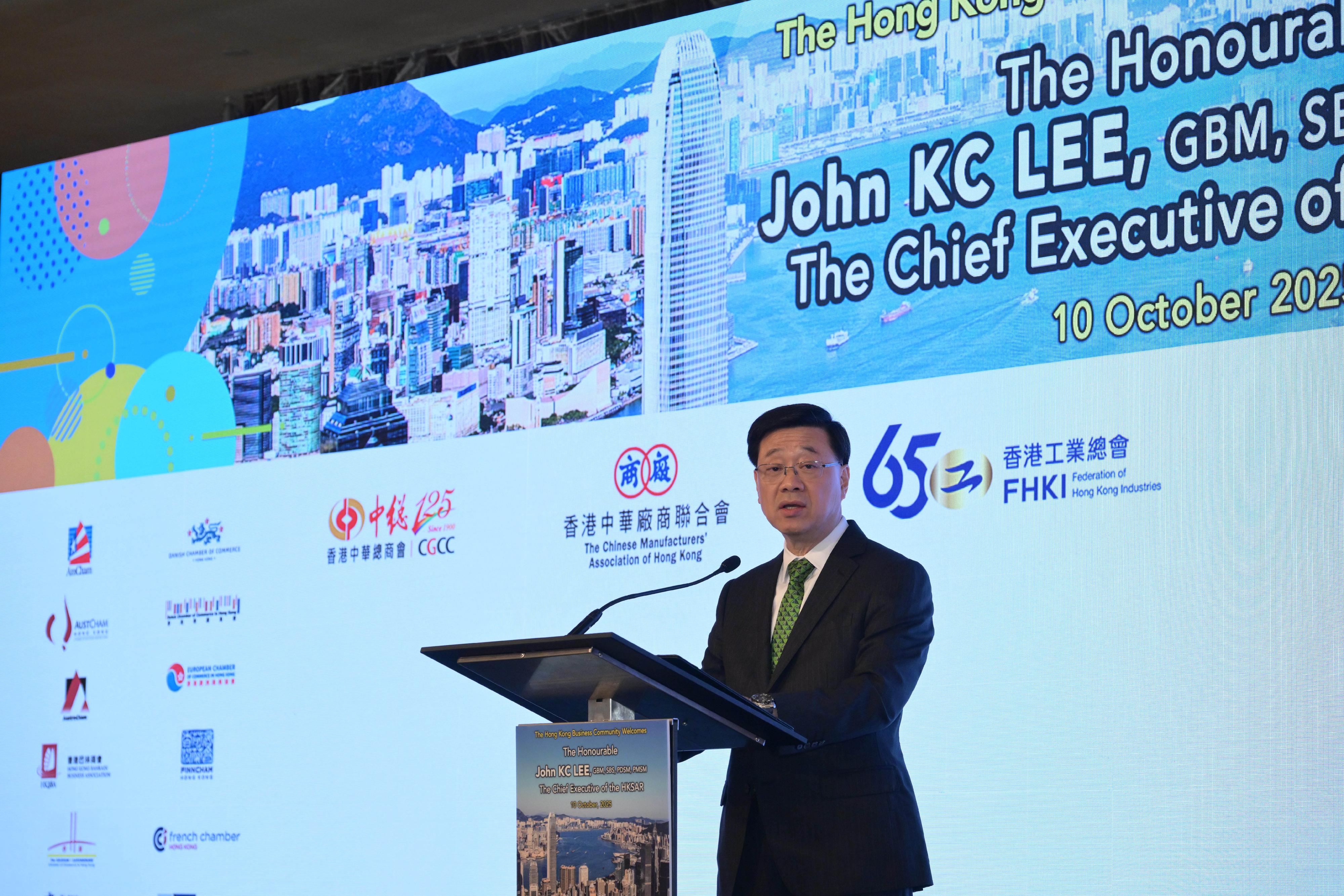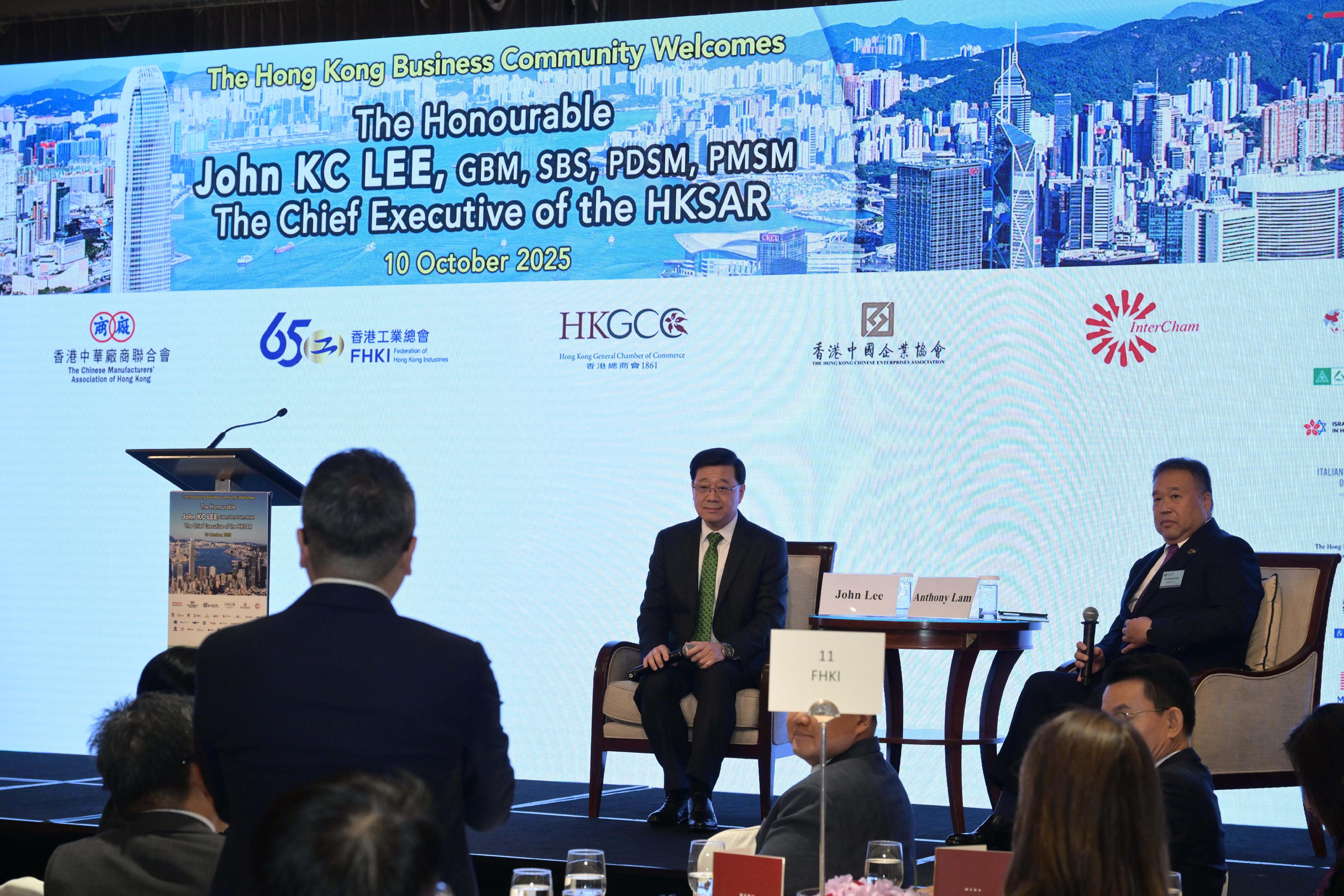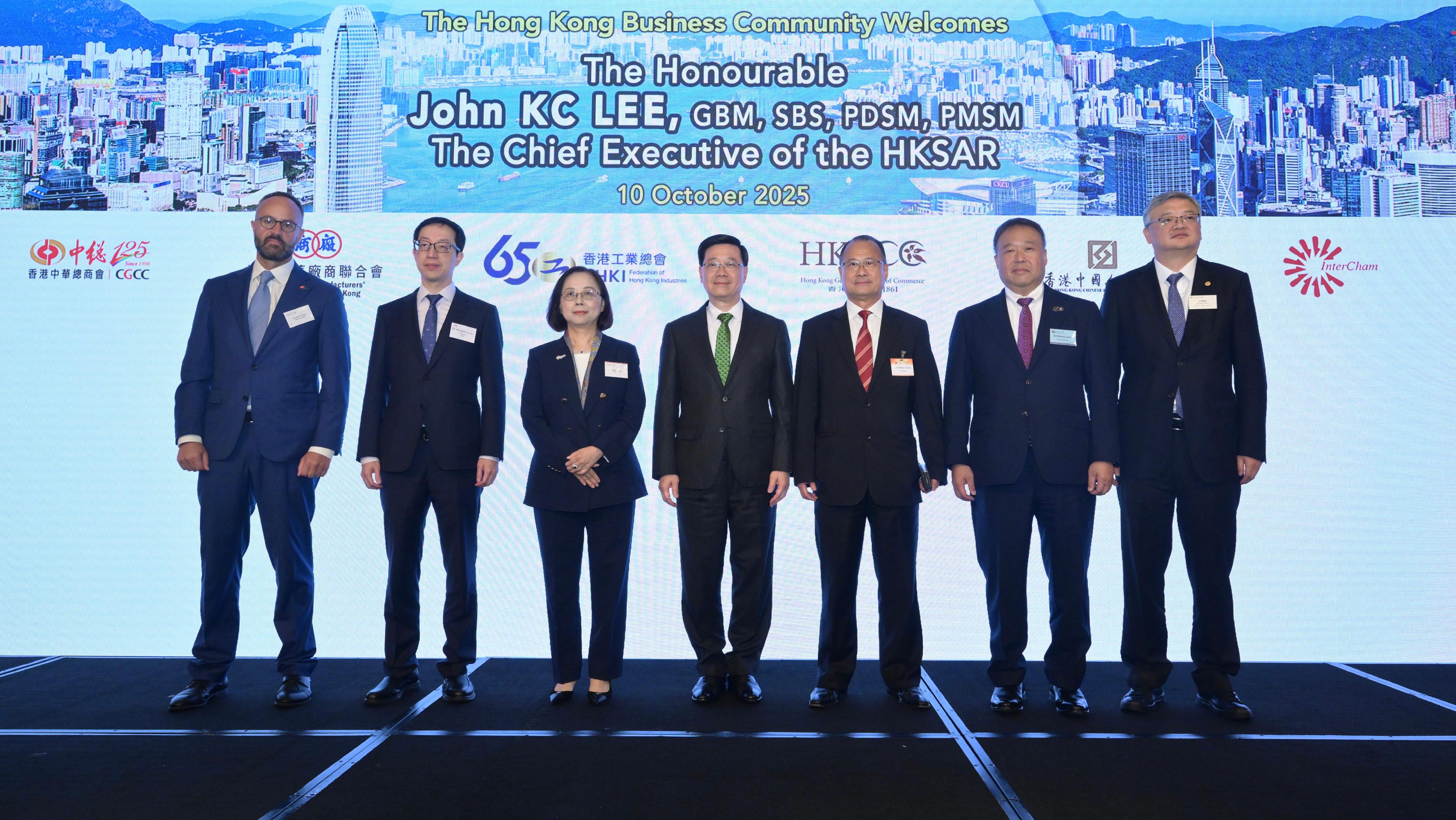Speech by CE at Joint Business Community Luncheon (English only) (with photos/video)
************************************************************************************
Ms Agnes Chan (Chairman of the Hong Kong General Chamber of Commerce), Dr Jonathan Choi (Chairman of the Chinese General Chamber of Commerce, Hong Kong), Dr Wingco Lo (President of the Chinese Manufacturers' Association of Hong Kong), Mr Anthony Lam (Chairman of the Federation of Hong Kong Industries), Mr Wang Haimin (Chairman of the Hong Kong Chinese Enterprises Association), Mr Davide De Rosa on behalf of InterCham (President of the Italian Chamber of Commerce in Hong Kong and Macao), Consuls-General, distinguished guests, ladies and gentlemen,
Good afternoon. I thank you for giving me this opportunity to come and join you, once again, for this essential annual gathering - the Joint Business Community Luncheon.
My thanks, first of all, to the main organisers: the Hong Kong General Chamber of Commerce; the Chinese General Chamber of Commerce, Hong Kong; the Federation of Hong Kong Industries; and the Chinese Manufacturers' Association of Hong Kong.
I have been told that over 400 of you are here today from five local chambers and 19 international chambers, together with a number of Consuls-General and other consulate officials.
Business and institutional leaders, entrepreneurs, innovators, investors and more, you're here for more than a fine social occasion - and the good lunch that comes with it.
I would like to take this opportunity to give you a better sense of the HKSAR (Hong Kong Special Administrative Region) Government's policies, and how they may fit with your plans - your future, your business and your career in Hong Kong, this beloved community we all call home.
The theme of the 2025 Policy Address is "Deepening Reforms for Our People, Leveraging Our Strengths for a Brighter Future". As I emphasised in the Policy Address, my ultimate objective is to improve the livelihood of the people of Hong Kong. And that's best realised through economic growth driven by continuing reforms.
Successful reform is a collective commitment. Working together, we can, and we will, create a brighter future for us all. And build an even more dynamic, innovative and business-friendly hub, as noted by Agnes.
International recognition
The results to date are no less reassuring. Confidence is returning to our businesses and industries, and our communities, shops, streets and homes. And the world has recognised these achievements.
In June, the annual World Competitiveness Yearbook, produced by the Swiss-based International Institute for Management Development, ranked Hong Kong third in the world, up two places from last year. In government efficiency and business efficiency, we rose one place and five places, respectively, to second overall, topping the rankings in "tax policy" and "business legislation". For international business and investors, Hong Kong is one big welcome mat.
And what a month September was, with Hong Kong in the international ratings spotlight, four remarkable times. Each honour recognises a distinctive facet of our revitalised economy.
I will start with innovation. Hong Kong, Shenzhen and Guangzhou are, collectively, recognised as the world's top innovation cluster, in the World Intellectual Property Organization's annual Global Innovation Index. That's up one place from previous years and our highest ranking ever.
In talent, we claimed fourth place, overall, in the World Talent Ranking, up from ninth in 2024 and 16th the year before. This also marks our highest-ever ranking in the report. And Hong Kong finished first in Asia and world's best in the percentage of graduates in sciences.
For economic freedom, Hong Kong was once again ranked No. 1, as the world's freest economy by the Canadian-based Fraser Institute last month.
And in finance, we placed third in the world in the Global Financial Centres Index, just one point back of London, and only two behind New York.
Those, and other international plaudits, are a compelling reflection of Hong Kong's cheering improvements - and in multiple sectors of our economy as well. They're powered by government policy and, more importantly, by the collaborative efforts of Hong Kong - of everyone in this room.
I would like to share with you some of the Government's policies and plans underlying those rankings, and new initiatives from my Policy Address last month. Together, they're designed to advance our economic development a good deal further.
Northern Metropolis
First of all, the Northern Metropolis. It is at the heart of the HKSAR Government's long-term policy priorities. An innovative new engine for our economy, a far-reaching and welcoming space for community and family, the Northern Metropolis symbolises the rewarding future we all want for Hong Kong. A future built on co-operation and the wide-ranging rewards it promises.
Given the boundless potential of the Northern Metropolis - given, too, its sheer size and the scale of funding required to bring it to full and sustainable life - I am taking a leading role in its development. As head of the new Committee on Development of the Northern Metropolis, I called our first meeting last week. And I am determined to fast-track its evolution, removing every possible speed bump in its path.
We aim to enact new, dedicated legislation within next year to accelerate the development of the Northern Metropolis. The legislation will streamline procedures for setting up and funding statutory industry park companies, fine-tune parameters for land development, and speed up compensation payment for land resumption. Speed, speed, speed.
We will expedite land and construction project approval and implementation. We will smooth the cross-boundary flow of people, goods, data, capital and more to attract the investors, businesses and research organisations that want a stake in the Northern Metropolis, and its far-reaching economic potential.
And that's just touching on the open-minded measures we are pursuing to bring Hong Kong's new powerhouse engine to engaging life, as expeditiously as possible. In my Northern Metropolis playbook, "soon" is not nearly soon enough.
The San Tin Technopole, a key area in the Northern Metropolis, will provide some 210 hectares of land dedicated to innovation and technology (I&T). The Government will publish the Conceptual Outline of the Development Plan for the Innovation and Technology Industry in the San Tin Technopole before year's end. With that, San Tin will begin its inevitable rise as the fast-beating I&T heart of the Northern Metropolis.
Tenants - from life and health technology, new energy, artificial intelligence and other strategic industries - have begun to move into the first three buildings of the Hong Kong-Shenzhen Innovation and Technology Park. Construction of five other buildings in the Park will be completed, progressively, from 2027.
This Hong Kong Park, together with Shenzhen Park, make up the Hetao Shenzhen-Hong Kong Science and Technology Innovation Co-operation Zone, an area that straddles our boundary with the neighbouring city of Shenzhen. Co-operation is central to the Zone and the Northern Metropolis, to Hong Kong and Shenzhen, and to the Guangdong-Hong Kong-Macao Greater Bay Area, of which we are a part. Our concerted collaboration will propel the Greater Bay Area's rise and shine as one of the world's greatest I&T hubs.
The Northern Metropolis will also excel as a centre for education. We are building a University Town there, on some 90 hectares of land. In my Policy Address, I noted that a Working Group on Planning and Construction of the University Town would be set up, one of three working groups under the Committee on Development of the Northern Metropolis.
It had its first meeting last week, highlighting the Government's strategy of integrating educational excellence and industry at University Town.
That's part of a larger goal, outlined in my Policy Address, of developing Hong Kong into an international education hub.
Hong Kong is proud to be home to five of the world's 100 top universities. In fact, in the latest World University Rankings just announced by Times Higher Education, all six of our previously ranked universities have risen to higher positions. Meanwhile, two more of our publicly funded universities have entered the Rankings for the first time. That, ladies and gentlemen, means that all eight of our publicly funded universities are on the Rankings, and in higher positions than last year. So we're making good progress, and that's thanks to everybody involved in the education sector, particularly in higher education.
Hong Kong demonstrated outstanding performances in key indicators of the Rankings, making sustained progress in such areas as teaching reputation and staff-to-student radio. That's probably why our universities are highly popular, with a double-digit year-on-year increase in the number of self-financing non-local applicants.
In my Policy Address, I also announced that the number of self-financing places for non-local students wishing to study at our post-secondary institutions will rise to 50 per cent, from the previous 40 per cent, beginning in the 2026/27 academic year - this is a strategy designed to create a more diverse and international student body.
To help our eight publicly funded universities recruit overseas and Mainland teachers and students, I have set aside funding support of $40 million for them. And the Government will establish a task force designed to attract more international teaching and research talent to Hong Kong.
Talent attraction
Talent is an essential component in the integrated development of education, technology and industry in the Northern Metropolis. Indeed, talent is central to every sector, industry, business and institution in Hong Kong.
Which is why we've introduced a range of talent admissions schemes since the end of 2022. Since then, more than 230 000 people have come to work here, with 70 per cent of them under the age of 40. The Top Talent Pass Scheme alone has brought in nearly 100 000 young professionals, mostly employed in the financial and I&T sectors. These are high-income individuals and degree holders from prominent international universities. For those whose Top Talent Pass has expired, some 55 per cent of them have applied for an extension of stay, continuing their contribution to our economy. And our businesses are willing to pay much higher salaries to them, which means that they are in high demand, and companies reckon that with what they pay, they get more out of it.
Attracting enterprises
Attracting businesses is also a policy priority of the Government. The results are just as encouraging. The Office for Attracting Strategic Enterprises, set up by me less than three years ago, has already attracted over 100 - the exact number is 102 - strategic companies to Hong Kong. They are bringing in investments of $60 billion and will create some 22 000 jobs.
Just yesterday, the Office welcomed three of the world's top 10 pharmaceutical firms to Hong Kong, alongside companies specialising in generative AI (artificial intelligence), autonomous driving, microelectronics, Web3 and new media.
Invest Hong Kong (InvestHK), our investment promotion agency, has helped over 1 300 Mainland and overseas companies set up or expand their business in Hong Kong. They are expected to bring in direct investment of more than $175 billion, while creating some 20 000 job opportunities.
To build on this success, I announced, in my Policy Address, that the Financial Secretary will lead a team of government and public organisations in putting together packages of preferential policies. These will include land grants and premiums, as well as financial subsidies and tax incentives.
The initiative is designed to encourage strategic industries and high-potential companies to set up in Hong Kong. Our goal is clear: to promote diversified, high-quality, long-term economic development.
Targeted industries include life and health technology, pharmaceuticals, aircraft recycling and trading, AI and new energy.
Artificial intelligence
Yes, artificial intelligence has become central to our lives. It helps with decision-making, reduces errors, and boosts productivity. It is the future of our development. I think the world has no choice.
The Government will promote AI as a core industry for Hong Kong. I have set aside $1 billion for the establishment, next year, of the Hong Kong AI Research and Development Institute. It will enable upstream R&D (research and development), as well as midstream and downstream outcomes.
And the $3 billion Frontier Technology Research Support Scheme, announced earlier, will help universities attract prominent researchers in AI and other fields.
The Hong Kong Investment Corporation, established in my first year in office, is investing in AI companies, in fields ranging from cloud computing to drug development.
Sustainable development
As for new energy, we are developing a sustainable aviation fuel industry chain, in concert with Mainland authorities and a local company setting up its business in the Greater Bay Area.
And we now have 28 hydrogen energy trial projects either underway or under preparation, covering everything from hydrogen buses to a hydrogen gas station. We will also develop hydrogen standard certification and work with Guangdong to develop the Greater Bay Area Hydrogen Corridor.
Going global
Our co-operation with the Mainland extends beyond the Greater Bay Area. Given the shifting global trade order, and our country's steadfast commitment to multilateralism, there is fast-growing demand for "Made in China" products. I see growing opportunities in helping Mainland companies go global through Hong Kong's customised, wide-ranging and world-class professional services.
In my Policy Address, I announced the establishment of a task force focused on supporting Mainland enterprises in going global. I am glad to add that this GoGlobal Task Force has already been launched earlier this week.
The task force brings together the overseas offices of InvestHK and the Trade Development Council, as well as Hong Kong offices on the Mainland. It is also joined by partners from various industries including legal, accounting, financial services, banking, chambers and professional organisations. It will smooth the way for Mainland companies taking their businesses globally.
Through Hong Kong, a "super connector" and "super value-adder", companies will connect, faster and more effectively, with international markets and buyers. Ladies and gentlemen, I am confident we can contribute to our country's development of its markets and business opportunities in the Global South, in Belt and Road regions and emerging markets everywhere. Thanks to the unique "one country, two systems" principle. Thanks to you, the companies and professionals driving Hong Kong's unparalleled strengths.
Culture, sports and tourism
But we need fun as well. There's a great deal more in this year's Policy Address, including wide-ranging measures designed to promote the integrated development of culture, sports and tourism. We work hard, but also we need to play hard, eat hard, drink hard and spend hard.
These measures range from the development of an arts trading hub and deepening ties with Art Basel, to boosting the West Kowloon Cultural District's international visibility, targeting yacht tourism and promoting sports development.
That certainly includes next month's 15th National Games, together with December's 12th National Games for Persons with Disabilities and the 9th National Special Olympic Games. These landmark Games mark the first time Hong Kong has served as a cohosting city - alongside Guangdong and Macao - in the country's top sports games.
That, ladies and gentlemen, will surely be an integrating, entirely electrifying, moment for Hong Kong, for our country, for us all.
In the interest of time, I think I better stop here. I look forward to taking your questions about this year's Policy Address. And Hong Kong's flourishing future.
Thank you for your time.
Ends/Friday, October 10, 2025
Issued at HKT 17:13
Issued at HKT 17:13
NNNN





